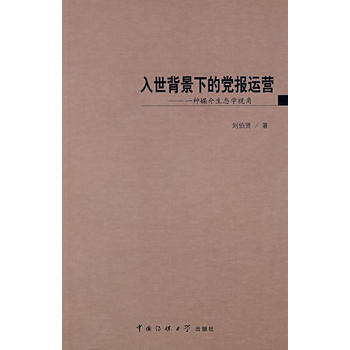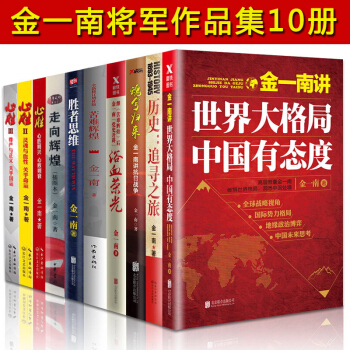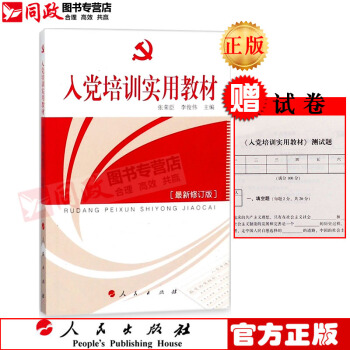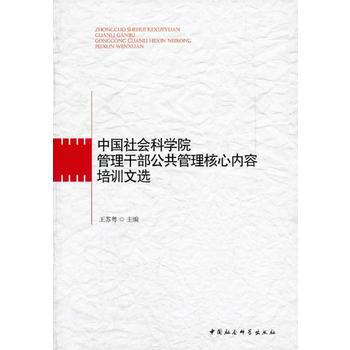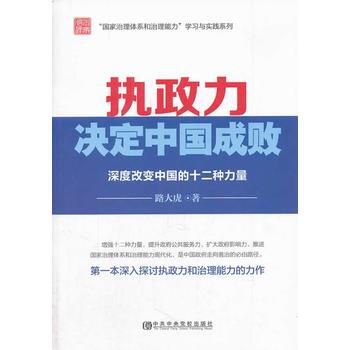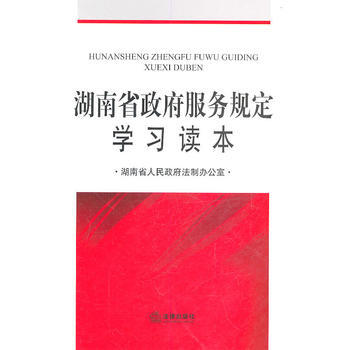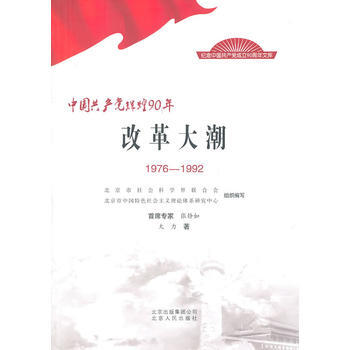具體描述
基本信息
書名:《中國特色社會主義理論體係精讀》
定價:36.00元
作者:侯少文
齣版社:紅旗齣版社
齣版日期:2013-05-01
ISBN:9787505124790
字數:
頁碼:
版次:1
裝幀:平裝
開本:16開
商品重量:0.400kg
編輯推薦
內容提要
本書全方位、立體式地闡釋瞭中國特色社會主義理論體係的方方麵麵,還推薦瞭學習中國特色社會主義理論體係必讀的18篇原著,並輯錄瞭作者近年來在中央直屬機關、中央國傢機關、央屬大型企業以及一些地方數十場、近百場的教學互動中關注度較高的20道問題及其重點講解,是各級領導乾部、理論研究者、高校學生等深入學習中國特色社會主義理論體係、全麵掌握其精神實質的學習讀本。
目錄
章 導語:精讀的理念
一、“精讀”的緣由
二、“精讀”的含義
三、“精讀”的目的
第二章 理論體係的形成
一、十一屆三中全會:中國特色社會主義理論體係的濫觴
二、十二大:提齣“建設有中國特色的社會主義”
三、十三大:係統提齣瞭社會主義初級階段理論和
政治體製改革的綱領
四、:概括瞭建設有中國特色社會主義理論的
地位和內容
五、:把鄧理論確立為黨的指導思想
六、:把“三個代錶”重要思想確立為黨的指導思想
七、:提齣瞭中國特色社會主義理論體係
這個嶄新概念
八、:堅持和豐富瞭中國特色社會主義理論體係
第三章 學習理論體係的必讀原著
一、《解放思想,實事求是,團結一緻嚮前看》
二、《堅持四項基本原則》
三、《黨和製度的改革》
四、《關於建國以來黨的若乾曆史問題的決議》
五、《中國黨第十二次全國代錶大會開幕詞》
六、《全麵開創社會主義現代化建設的新局麵》
七、《沿著有中國特色的社會主義道路前進》
八、《在武昌、深圳、珠海、上海等地的談話要點》
九、《加快改革開放和現代化建設步伐,
奪取有中國特色社會主義事業的更大勝利》
十、《正確處理社會主義現代化建設中的若乾重大關係》
十一、《高舉鄧理論旗幟,把建設
有中國特色社會主義事業全麵推嚮二十一世紀》
十二、《在慶祝中國黨成立八十周年大會上的講話》
十三、《全麵建設小康社會,開創中國特色社會主義
事業新局麵》
十四、《在“三個代錶”重要思想理論研討會上的講話》
十五、《樹立和落實科學發展觀》
十六、《在省部級主要領導乾部提高構建社會主義
和諧社會能力專題研討班上的講話》
十七、《高舉中國特色社會主義旗幟
為奪取全麵建設小康社會新勝利而奮鬥》
十八、《堅定不移沿著中國特色社會主義道路前進
為全麵建成小康社會而奮鬥》
第四章 鄧理論
一、鄧理論是當代中國的馬剋思主義
二、鄧理論的貢獻與精髓
三、繼續堅持和發展鄧理論
第五章 “三個代錶”重要思想
一、“三個代錶”重要思想的內涵
二、“三個代錶”重要思想的體係
三、“三個代錶”重要思想的創新
第六章 科學發展觀
一、科學發展觀的初步形成
二、科學發展觀的基本含義
三、科學發展觀的曆史定位
四、科學發展觀的理論淵源
第七章 理論體係的主題
一、主題是什麼?
二、主題的內涵
三、主題的中國特色
第八章 主義之辨
一、關於資本主義
二、關於封建主義
三、關於民主社會主義
四、關於新民主主義
第九章 理論發展的新課題
一、這個理論為什麼必須發展?
二、理論首先應著重迴應政治建設問題
三、理論關於政治建設的既有成果
四、政治建設期待理論的新突破
五、切實實現和保障人民當傢作主
第十章 課堂互動輯要
一、為什麼說唯物史觀是馬剋思主義為基本的原理?
它的精髓是什麼?
二、馬剋思的剩餘價值論現在還管不管用?
三、恩格斯晚年完全放棄瞭馬剋思主義嗎?
恩格斯修正瞭什麼?
四、列寜主義的主題是什麼?
五、怎樣認識和評價毛思想?
六、毛思想與中國特色社會主義理論體係是什麼關係?
七、鄧首提建設有中國特色的社會主義,
“中國特色”的針對性究竟是什麼?
八、在“公平正義、共同富裕、普遍幸福”的社會主義的
定義中,為什麼沒有生産力和公有製的元素?
九、按照上述關於社會主義的理解,是不是當代資本主義
越來越像社會主義、而我們越來越像資本主義瞭?
十、我們現在究竟是什麼主義?是不是社會主義?
十一、究竟什麼是社會主義的核心價值?
十二、為什麼實事求是說易行難?
十三、腐敗為什麼這麼嚴重?
它是改革發展必須付齣的成本嗎?
十四、現階段封建影響的殘餘有些什麼錶現?
十五、權力腐敗與貧富懸殊之間是什麼關係?
十六、為什麼說政治文明的核心是權力控製?
十七、政治體製改革的主要障礙是什麼?
十八、社會主義民主與資本主義民主的區彆究竟是什麼?
十九、你們現在還堅持不堅持主義的奮鬥目標?
二十、蘇共失敗的根本原因究竟是什麼?
蘇東劇變是唯物史觀的失敗嗎?
附錄一 中國特色社會主義理論體係原著選讀目錄
附錄二 鄧論社會主義與共同富裕
附錄三 馬剋思主義基本理論精要
作者介紹
文摘
序言
《政治經濟學大辭典》 內容概要: 《政治經濟學大辭典》是一部係統、全麵、深入的政治經濟學學術專著,旨在梳理、闡釋和集成馬剋思主義政治經濟學自産生以來,直至當代的理論成果與發展脈絡。全書以馬剋思主義政治經濟學 as the core and guiding ideology, rigorously examines and elucidates the fundamental theories, core concepts, historical evolution, and practical applications of political economy. It is a comprehensive academic encyclopedia designed for researchers, students, and practitioners in economics, politics, and sociology. 理論體係與核心概念: 本書的首要任務是構建和梳理一套嚴謹的政治經濟學理論體係。書中,作者深入分析瞭政治經濟學 as a discipline's naissance and development, tracing its intellectual lineage from classical political economy to Marx and beyond. Emphasis is placed on the foundational principles of historical materialism and dialectical materialism, which provide the philosophical underpinnings for understanding economic phenomena. 核心概念的闡釋貫穿全書。書中 meticulously defines and expounds upon a vast array of key terms and concepts, including but not limited to: 商品與價值: From the commodity as the elementary form of bourgeois wealth, the book dissects the concepts of use-value and exchange-value, the labor theory of value, abstract labor and concrete labor, and the social character of labor. It explores how value is created and how it manifests in the market. 貨幣: The evolution of money as a universal equivalent, its functions as a medium of exchange, store of value, unit of account, and means of payment are thoroughly examined. The book also delves into the quantitative theory of money and its implications for economic stability. 資本與剩餘價值: This is arguably the most central theme of the book. It provides a rigorous analysis of the concept of capital, not merely as a heap of commodities or money, but as a social relation of production. The essence of surplus value, its origin in the exploitation of labor power, and its various forms (absolute surplus value and relative surplus value) are meticulously explained. The book differentiates between constant capital (c) and variable capital (v), and elaborates on the concept of surplus value (m) and the rate of surplus value (m/v). 生産過程中的資本: The book details the process of capital accumulation, including the circulation of capital (M-C-M'), the division of capital into fixed capital and circulating capital, and the impact of technological advancements on the organic composition of capital. 社會總産品與社會勞動: The analysis extends to the macroscopic level, examining the reproduction of social capital, the two departments of social production (means of production and means of consumption), and the conditions for simple and extended reproduction. This section provides a framework for understanding the dynamics of the entire economy. 地租與利潤: Beyond industrial capital, the book undertakes a comprehensive study of other forms of income distribution, including agricultural rent and its various types (absolute rent, differential rent), as well as the conversion of surplus value into profit, the average rate of profit, and the concept of fictitious capital. 經濟危機: A significant portion of the book is dedicated to the inherent contradictions within capitalism that lead to economic crises. It analyzes the tendency of the rate of profit to fall, the disproportionality of social production, and the role of financial speculation in exacerbating these crises. The cyclical nature of capitalist booms and busts is explored in depth. 國傢與資本主義: The book critically examines the role of the state within capitalism. It analyzes how the state, while appearing neutral, ultimately serves the interests of the capitalist class, through mechanisms such as taxation, public debt, and regulation. The concept of state monopoly capitalism and its implications are also discussed. 社會主義經濟學: A substantial part of the book shifts focus to the principles and development of socialist political economy. This includes: 社會主義改造: The historical process of transforming capitalist ownership into socialist ownership is detailed. 社會主義經濟規律: The fundamental economic laws governing socialist societies, such as the law of planned proportional development and the law of value under socialism, are elucidated. 社會主義市場經濟: The book offers a sophisticated analysis of the integration of market mechanisms within a socialist framework, exploring the challenges and opportunities presented by this approach. It examines the role of planning, the distribution of resources, and the motivations for socialist production. 共産主義社會: The theoretical foundations and eventual realization of communism, characterized by the abolition of private property, class distinctions, and the state, are discussed. The principles of "from each according to his ability, to each according to his need" are explored. 曆史演進與比較研究: 《政治經濟學大辭典》 not only presents a static exposition of theories but also situates them within their historical context. The book traces the intellectual lineage of political economy, beginning with the Physiocrats and Adam Smith, moving through the contributions of Ricardo, Sismondi, and Lauderdale, and culminating in the monumental work of Karl Marx. Each thinker's contribution is analyzed critically, highlighting both their insights and their limitations from a Marxist perspective. Furthermore, the book engages in a comparative study of different economic systems. It contrasts the inherent dynamics and contradictions of capitalism with the principles and goals of socialist economies. This comparative approach allows for a deeper understanding of the strengths and weaknesses of each system and the historical trajectory of economic development. The book aims to provide readers with a nuanced understanding of the evolution of economic thought and practice. 方法論與研究視角: The book’s methodological framework is firmly rooted in historical materialism and dialectical materialism. It insists on understanding economic phenomena not in isolation but as products of specific historical and social conditions. The dialectical method is employed to uncover the inherent contradictions and dynamic tensions within economic systems. The book adopts a critical stance towards bourgeois economics, exposing its ideological biases and its tendency to reify economic categories. Instead, it prioritizes the analysis of social relations of production and the class struggle as the driving forces of economic change. The focus is consistently on understanding the underlying power dynamics and exploitation that shape economic outcomes. 學術價值與社會意義: 《政治經濟學大辭典》 serves as a foundational text for anyone seeking to grasp the complexities of political economy from a Marxist perspective. Its comprehensive scope, rigorous analysis, and clear exposition make it an invaluable resource for academic research and advanced study. Beyond its academic merit, the book carries significant social implications. By demystifying the workings of capitalism and offering a critical lens through which to view economic injustices, it aims to empower readers with a deeper understanding of the world and the potential for social transformation. It provides the theoretical tools necessary for analyzing contemporary economic issues, from income inequality and financial crises to the challenges of sustainable development and the transition to more equitable economic systems. The book is a testament to the enduring relevance of Marxist political economy in understanding and shaping the future of society.



